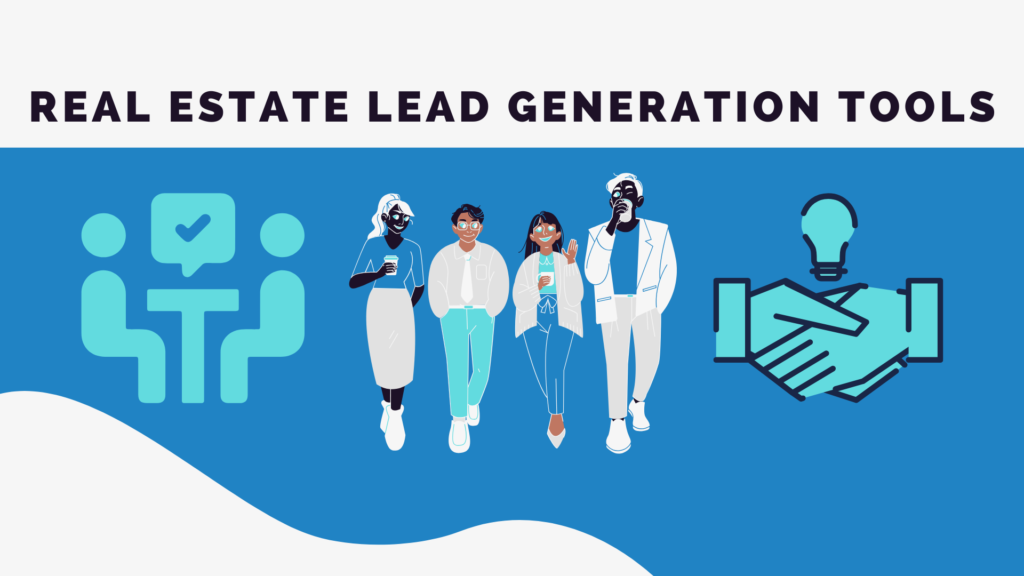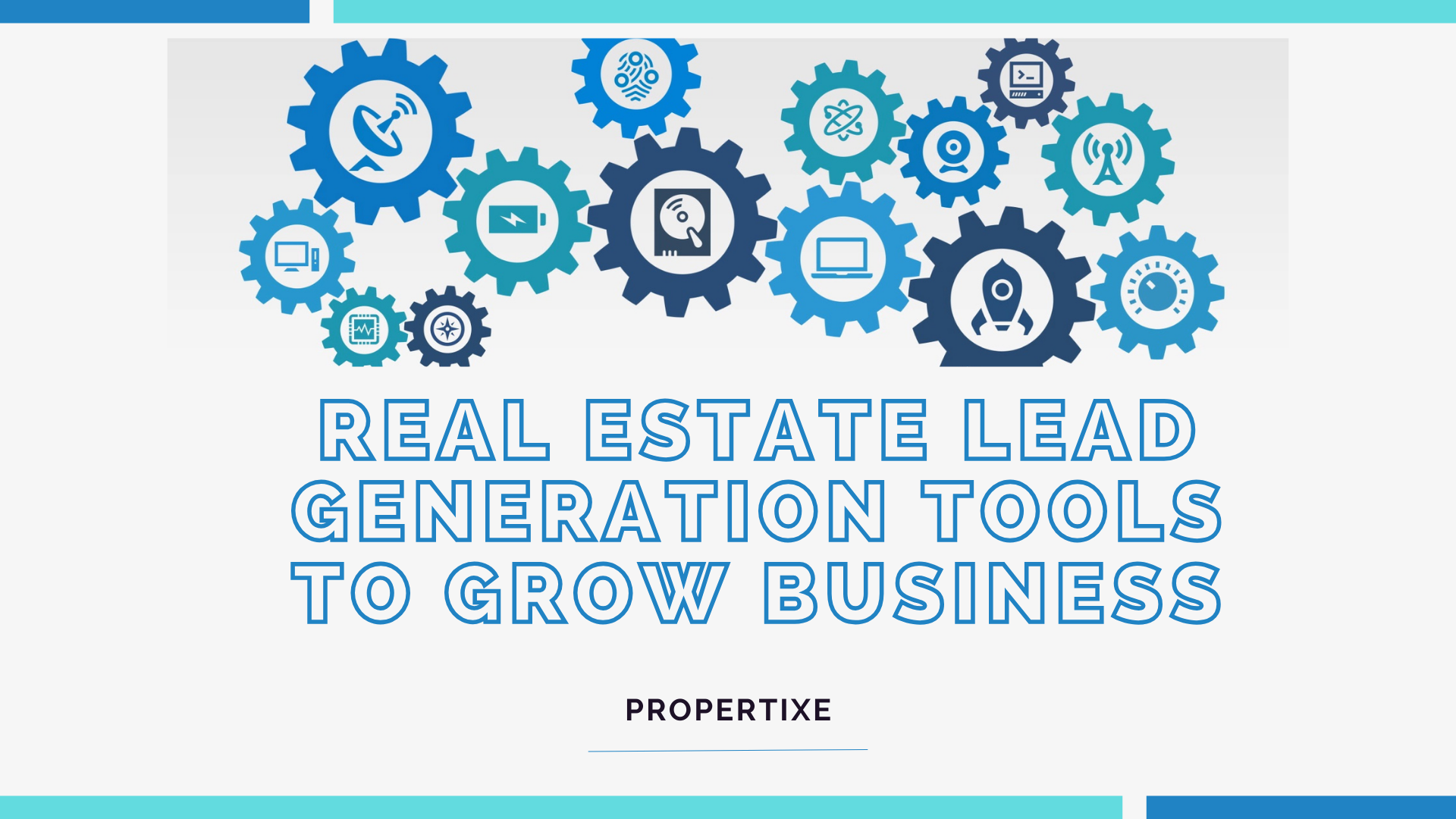Introduction
The process of generating leads is among the main aspects to developing a successful real estate company. Without consistent supply of leads, realtors have to work hard to complete deals and sustain a consistent income. The traditional methods of cold calling and door knocking continue to work but require the time and energy. However, the advent of the Real Estate Lead Generation Tools make it much easier to identify potential buyers and sellers. By using the appropriate tools, real estate agents can streamline marketing, analyze lead behavior to convert leads to clients faster.
In this blog, we will look at the way lead generation tools operate and the most effective options and the best ways to make use of them to increase the growth of your company.

Problem: The Struggle of Finding Quality Leads
The industry of real estate is highly competitive and obtaining quality leads isn’t an easy task. Agents take a long hours contacting potential customers and receive a rejection. Traditional marketing techniques such as print advertisements, flyers or billboards could bring some attention, but they’re not precise.
Real estate professionals are often faced in the following areas:
- Looking for serious buyers and sellers rather than window-shopping.
- Following up and managing many leads in a timely manner.
- Confronting other agents on a competitive market.
If they don’t have the proper approach Agents often waste their time with leads that are not qualified as well as miss out on opportunities with serious buyers. That’s why using the best lead generation tools is crucial.
Agitation: The Cost of Poor Lead Generation
Ineffective lead generation could result in slow growth of businesses and financial pressure. If agents are unable to generate sufficient quality leads it could result in:
- You can spend money on unproductive advertising campaigns.
- Be a struggle to close transactions and earn commissions.
- Reduce the number of customers you may lose to competitors using more effective strategies.
Based on the National-Association-of-Realtors (NAR) study that 47% of real estate firms fail within five years due to inconsistency leads flowing. Without a well-designed lead generation system agents are at risk of burnout and frustrated.
One study conducted by HubSpot found that agents who use automated lead generation software improved their rate of conversion by about 35 percent. It is clear that technology plays a an important role in the growth of the real estate industry.
Solution: How Real Estate Lead Generation Tools Can Help
The tools for lead generation can aid real estate professionals to identify how to attract and keep prospective clients. Automated systems, AI as well as the tracking of data to enhance lead quality and increase the conversion rate. They work as follows:
- Automation Software to generate leads will automate the process of outreach and reduces the need to perform manually prospecting.
- Data Tracking Tool: These instruments analyze the user’s behavior and assist agents in determining whether the lead is ready to purchase or to sell.
- CRM Integration: Several applications integrate with customer-relationship-management (CRM) systems that make it easy to follow-up and track with leads.
We’ll now take a look at the most effective leads-generating tools that are available to real estate agents.
1. CRM Systems: Managing and Tracking Leads Efficiently
The Customer Relationship Management (CRM) software is essential for professionals in real estate. It helps to organize leads, manages follow-ups and automation and records interactions. Some of the most well-known real estate CRMs include Zoho CRM, HubSpot, and Salesforce.
In a report done by RealTrends that use CRMs, salespeople who have them are up by 26% to conclude deals than those who depend on manual recording. CRMs can help identify leads with high value and help streamline communications.
Personal Insight
I had to track my leads using spreadsheets and it became overwhelming. The switch to CRM has helped me to organize my contacts, send automated emails and monitor interactions, which made my follow-ups much more efficient.
2. Social Media Lead Generation Tools
Social media sites ( Facebook, Instagram, and LinkedIn) are now essential to the generation of leads for real estate. Tools such as Facebook Ads Manager, LinkedIn Sales Navigator and Buffer enable agents to reach certain audiences and interact potential buyers.
An Sprout Social study found that 54% of homeowners make use of social media when researching homes before making contact with an agent. Using targeted ads and entertaining posts on these platforms increase exposure and leads.
Personal Insight
I first started making use of Facebook lead form to gather questions, and the responses was quick. The lead forms eliminated the need for cold marketing and attracted serious buyers that were already looking at properties.
3. Email Marketing Tools: Nurturing Leads Over Time
Marketing via email is the most effective methods to build relationships with real estate leads. Software such as Mailchimp, Constant Contact, and ActiveCampaign automatize email messages to ensure constant engagement with clients who are interested in becoming customers.
As per Campaign Monitor, real estate emails have an average opening rate of percent and are therefore a reliable method of staying in contact with potential leads. Automated follow-ups can increase the likelihood of being converted.
Personal Insight
I used to mail emails by hand, but it was difficult to track responses. When I started using an automated email software, I observed an increase of 40% in responses, leading to a greater number of scheduled meetings as well as concluded contracts.
4. IDX Web Tools for Capturing Leads From property searches
A IDX (Internet Data Exchange) website lets agents show MLS listing on their websites. Platforms such as Placester, RealtyNinja, and AgentFire provide custom IDX websites which collect leads when people look for homes.
An analysis of Inman News found that 63 percent of buyers begin their research online. This makes an IDX website an effective lead-generation tool. Agents are able to collect visitor information and convert them into customers.
Personal Insight
After I had implemented an IDX feature on my site and began to receive increased organic leads. Buyers are enthralled by searching ads in real time, and it made me appear as the go-to source within my industry.
5. Lead Capture Chatbots and AI Assistants
Chatbots powered by AI such as Drift, ChatFuel, and ManyChat interact with visitors to websites immediately, responding to questions as well as collecting information about leads. The tools will guarantee that no prospective client will be left without a response.
An Harvard Business Review study found that firms that use AI chatbots are able to respond 60 percent faster, which leads to a higher rate of engagement. Chatbots are working 24/7 and can be used to assist in taking leads even when the agents aren’t online.
Personal Insight
I had been losing leads due to the fact that I wasn’t able to respond immediately to every request. Once I had a chatbot added to my site, I noticed that my responses increased, and I was able to book additional appointments, without having to do any extra effort.
6. Online Advertising Platforms for Paid Lead Generation
Paid-for advertising platforms such as Google Ads, Facebook Ads and YouTube Ads permit real estate agents to create targeted leads rapidly. With campaigns targeted to geography, demographics and the intent of search, realtors can draw in high-quality leads.
A study by WordStream indicates WordStream that Google Ads have a 4.4 percent average conversion rate for businesses in real estate. That means well-optimized campaigns are able to generate steady results.
Personal Insight
I was reluctant to invest advertising money, however after experimenting with a tiny budget for Google Ads, I saw immediately the outcomes. Today, I dedicate part of the marketing budget towards led generation through paid leads every month.
7. Referral and Networking Tools for Lead Generation
Networking is an effective method to create leads for real estate. Platforms such as Parkbench, ReferralExchange, and UpNest provide agents with prospective customers through referrals as well as the community.
According to NAR that 41% of all real property transactions are based on referrals. This highlights how important it is to build solid relationships in the field.
Personal Insight
I primarily relied on leads from online sources before I joined an local network group. Referrals from previous clients and business connections resulted in more sales than I anticipated.
8. Predictive Analytics Tools for Finding High-Intent Leads
Predictive analytics tools such as Revaluate, SmartZip, and Offrs use data analysis to help predict the homeowners most likely to be selling soon. These tools can help real estate agents focus on the most An analysis done by RISMedia revealed that people who used predictive analytics experienced increased by 20% on conversion rates than those who use traditional prospecting methods. It gives them an edge over their competitors.
Personal Insight
I was skeptical about predictive analysis. However, when I tried it I came to appreciate the power of the information. This allowed me to identify homeowners ready to sell their house which saved me time and time and.

Trending topics
1. How to Choose the Right Real Estate Lead Generation Tool
With a myriad of possibilities to to picking the most effective tool to use to help generate leads may be complicated.
Agents must consider things like budget, size of business, and the specific objectives of lead generation. A sole agent may be able to benefit from a basic CRM, such as Zoho or LionDesk however an agency might require a sophisticated system like Salesforce. Agents who are focused on paying ads must invest in tools such as Facebook Ads Manager, while people who depend on referrals ought to make use of UpNest as well as ReferralExchange.
2. The Role of SEO in Real Estate Lead Generation
The process of search engine Optimization (SEO) plays crucial to the generation of organic leads for realtors. Sites optimized using relevant keywords for example “homes for sale in [city]” or “top real estate agents in [city]” will increase the ranking in search engine results as well as attract buyers. Utilizing tools like Google Analytics, SEMrush, and Yoast SEO can help agents in monitoring the effectiveness of their sites and increase the visibility of their website. According to NAR 53% of buyers start their search on the internet which makes SEO the most important approach to generating leads.
3. Best Free Lead Generation Tools for Real Estate Agents
Agents may not are able to afford expensive lead-generation tools, however there are a number of free tools that can work. The free CRMs such as HubSpot CRM can help agents organize contact information, and social media tools such as Buffer and Hootsuite enable scheduling of posts that can be used to interact with potential customers. Google My Business is another free program that assists local businesses get leads through making their websites more search-friendly. Marketing solutions for email that are free like Mailchimp (for smaller lists) will also aid agents in nurturing leads, without any upfront fees.
4. How to Use Landing Pages for Real Estate Lead Generation
Landing pages can be an efficient method of capturing lead data. A properly designed landing page contains an easy call-to-action (CTA) with high-quality pictures as well as a simple-to-fill-in form. Software such as Leadpages or ClickFunnels Unbounce assist real estate professionals to develop landing pages for their properties, valuation offers, and even free buyer/seller guidebooks. According to HubSpot websites with captivating CTAs will increase conversion rates by up to 50%..
5. How Retargeting Ads Work for Real Estate Lead Generation
Retargeting advertising helps agents reconnect with those who visit their site but did not make a purchase. They follow people through Facebook, Google, and Instagram and remind users of the properties they visited or the services they could avail. Tools like AdRoll along with Google Display Network help real property professionals create advertising that targets users. A WordStream study found that ads designed to retarget users increase convert rates of 70 and this makes the tool helpful in nurturing prospects.
6. Lead Generation Through YouTube and Video Marketing
Video-marketing has proven to be a successful lead-generating tool for leads in real property. platforms like YouTube, TikTok, and Instagram Reels allow agents to show their properties, share information about the current market conditions, as well as communicate with buyers. Tools like Animoto and BombBomb are able to help you produce professionally-looking real estate videos. According to an NAR study that discovered the 73% potential buyers would prefer to interact with realtors making use of video marketing. Videos are a great way to attract attention, as well as aiding to convert leads efficiently.

Conclusion
Lead generation is the rumor mills of real estate are essential for realtors looking to increase their income. If it’s utilizing a CRM system, using advertising on social media, or automating emails to follow-up using the appropriate tools, they can streamline lead generation processes and boost conversions. Agents who invest in technological advancements remain ahead of the pack and earn more clients regularly. Begin incorporating these tools into your plan and see your real estate business expand.
FAQS
1. What are the real estate lead generation methods?
Lead generation tools for real estate are platforms and software that assist agents to find, draw prospective buyers as well as sellers. They include CRM software and social media platforms for advertising as well as email marketing software as well as predictive analytics tools.
2. What are the reasons lead generation tools are crucial for realtors?
The tools for lead generation can assist in saving time, boost the quality of leads and increase conversion rates. These tools help marketers automatize marketing, monitor leads and keep their records organized. This leads to more profitable transactions and growth for businesses.
3. What are the most effective CRM tools to generate leads for real estate?
Most popular CRM systems used specifically designed for real estate use Zoho CRM, HubSpot, Salesforce and LionDesk. These systems help agents to manage leads, streamline follow-ups and monitor client interactions effectively.
4. How does social media can help create leads in real estate?
Social media platforms (Instagram, facebook and LinkedIn) as well as YouTube permit agents to create targeted advertisements, communicate with prospective buyers as well as showcase listings of properties. Tools such as Facebook Ads Manager and LinkedIn Sales Navigator help in leads generation strategies.
5. Are paid advertising platforms effective for real estate lead generation?
Yes, paid-for platforms for advertising like Google Ads and Facebook Ads permit agents to target certain areas and demographics. The research shows they Google Ads have an average conversion rate of 4.4 percent in the real estate industry and are a great instrument for attracting prospects.
6. What exactly is an IDX website and how can it aid the process of lead generation?
A IDX (Internet Data Exchange) website incorporates MLS listings onto an agents site, which allows visitors to look up properties in real time. Platforms such as Placester and AgentFire offer IDX services that collect user data to generate leads.
7. What are the best email marketing tools to assist in the generation of leads?
Tools for marketing via email such as Mailchimp, Constant Contact, and ActiveCampaign enable agents to create automated email campaigns, follow up with leads over time and keep in touch with prospective buyers as well as sellers. The average email marketing campaign has an acceptance rate that is 27% for the real estate industry.
8. Are AI chatbots help improve the quality of leads for property?
Sure, AI chatbots like Drift and ManyChat can respond to queries 24/7 and collect information about leads and offer instant assistance. The research shows that businesses who use chatbots increase response time by 60percent, which leads to higher conversion and engagement.
9. What tools are predictive analytics for real estate?
Analytics tools that predict the future such as Revaluate and SmartZip examine data in order to pinpoint homeowners that are likely to move in the near future. The agents can then concentrate on leads that are highly interested instead of cold-calling increasing lead conversion rates.
10. What should I consider when choosing the most effective lead generation tool for my firm?
The ideal tool is dependent on your budget, market, and your business’s goals. Agents must begin with basic tools such as CRM system, Facebook advertisements as well as email marketing. and then move on to more advanced tools such as predictive analytics and AI chatbots when their business expands.

